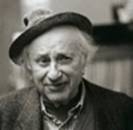Author-radio host-actor-activist and Chicago symbol Louis “Studs” Terkel died today at his Chicago home at age 96. . .
Rick Kogan, Chicago Tribune – Louis Terkel arrived here as a child from New York City and in Chicago found not only a new name but a place that perfectly matched–in its energy, its swagger, its charms, its heart–his own personality. They made a perfect and enduring pair.
Author-radio host-actor-activist and Chicago symbol Louis “Studs” Terkel died today at his Chicago home at age 96. . . A television institution for years, a radio staple for decades, a literary lion since 1967, when he wrote his first best-selling book at the age of 55, Louis Terkel was born in New York City on May 16, 1912. “I came up the year the Titanic went down,” he would often say.
He moved with his family when they purchased the Wells-Grand Hotel, a rooming house catering to a wide and colorful variety of people. He supplemented the life experiences there by visits to Bughouse Square, the park across the street from the Newberry Library that was at the time home to all manner of soap box orators. . .
He attended the University of Chicago, where he obtained a law degree and borrowed his nickname from the character in the ” Studs Lonigan” trilogy by Chicago writer James T. Farrell. He never practiced law. Instead, he took a job in a federally sponsored statistical project with the Federal Emergency Rehabilitation Administration, one of President Franklin D. Roosevelt’s “New Deal” agencies. Then he found a spot in a writers project with the Works Progress Administration, writing plays and developing his acting skills.
Terkel worked on radio soap operas, in stage plays, as a sportscaster and a disk jockey. His first radio program was called “The Wax Museum,” an eclectic gathering of whatever sort of music struck his fancy, including the first recordings of Mahalia Jackson, who would become a friend.
When television became a force in the American home in the early 1950s, Terkel created and hosted “Studs’ Place,” one of the major jewels in the legendary “Chicago school” of television that also spawned Dave Garroway and Kukla, Fran and Ollie.
It was on “Studs’ Place,” which was set in a tavern, that large numbers of people discovered what Terkel did best–talk and listen. Terkel, arms waving, words exploding in bursts, leaning close to his talking companions, didn’t merely conduct interviews. He engaged in conversations. He was interested in what he was talking about and who he was talking to.
But his TV career did not last. Terkel later complained that the commercialization of television forced his show, and the others in the “Chicago school,” from the air. Also, at that time, McCarthyism was a potent force and Terkel was outspoken politically, with a highly liberal tone. “I was blacklisted because I took certain positions on things and never retracted,” Terkel once said in an interview about those times. “I signed many petitions that were for unfashionable causes and never retracted.”
He had a hard time finding work, subsisting on small speaking fees and even smaller sums for writing book reviews. His wife, Ida, made enough to keep the family afloat.
He found a larger audience when he was hired at a new fine arts station, WFMT, where Terkel’s brand of chatter, jazz, folk music, and good conversation was a perfect fit. His political views were more tolerated on the station, and Terkel began his morning radio show in 1952.
In the mid-1960s, Terkel was in his mid-50s, a time when most people are beginning to plan the end of their careers. Terkel was about to start a new one. . .
“I think of myself as an old-time craftsman,” Terkel said. “I’ve been doing this five days a week, for more than 30 years. When I realize the work is slipping, I’ll quit. But I don’t think I’ve reached that point yet. I still have my enthusiasm. I still love what I do.”


